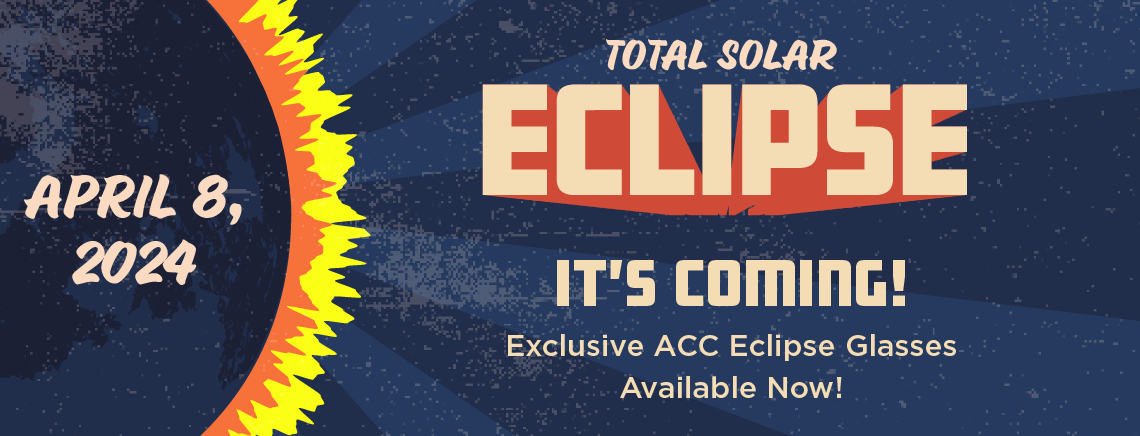
Watch the 2024 Total Solar Eclipse with ACC
Are you ready for a once-in-a-lifetime event? On April 8, 2024, a total solar eclipse will pass directly over Central Texas.
Grab your exclusive, ACC-branded 2024 Total Solar Eclipse glasses on any ACC campus and you’ll be ready to safely view this stunning spectacle.
What is a Solar Eclipse?
A solar eclipse happens when the moon’s orbit passes in front of the sun, blocking it from view. In most eclipses, the moon doesn’t fully cover the sun as it passes in front of it. But, in a total solar eclipse, the moon blocks the sun completely, turning the sky dark enough to see the stars and planets, and causing a 360-degree sunset. To experience this awe-inspiring event one needs to be inside the corridor of totality. You can check the exact time and duration of the eclipse at your location using this interactive map from the National Solar Observatory.
Austin Community College Physics professor Dr. Michael Endl has the details on what makes a total solar eclipse such a remarkable celestial event.
Get Your FREE ACC-Branded Eclipse Glasses
To safely observe the eclipse, you’ll need special, certified safety glasses. ACC offers specially branded eclipse glasses to students, employees, and the community at every college campus. These glasses are now available for pickup.
These solar eclipse glasses are provided by Urban Circle. According to the supplier, the glasses are manufactured by an American Astronomical Society-approved supplier and can filter out 100% of harmful ultraviolet and infrared rays and 99.9% of intense visible light. They comply with ISO 12312-2, FDA, and CE regulations. PPE Test Report, Certificate of Conformity
Student & Employee Riverbat Community
ACC students & employees can pick up their eclipse glasses at any Student Life Office districtwide. You’ll need to show your ACC ID card to pick up your glasses.
Limit three per person.
Greater Central Texas Community
Community friends and partners are invited to pick up ACC-branded eclipse glasses at any ACC campus. Please visit the Campus Manager’s Office at a campus near you. Limit three per person.
Fun Facts About the Eclipse
Hidden toggle - don't delete
How often does a Solar Eclipse occur?
So, solar eclipses are actually not that rare. On average, they’ll occur every 18 months. But what is very rare is that you, on even given point on this planet, will be under the shadow of the moon. So when the moon casts its shadow onto the surface of the earth it actually only covers a very tiny portion, less than one percent of the surface area. So it is really a thing about you have to be at the right time at the right place.
What's the difference between a Total Eclipse and a Partial Eclipse?
Like the name says, one is total, meaning the moon covers 100% of the surface of the sun and the other one is called partial because the moon doesn’t cover 100%. Maybe just 90% or 99%. The difference is literally day and night becase just 1% still visible of the sun is bright enough to make it look to you to almost look like a normal day. A total eclipse, when the sun is completely covered, then you will see all these spectacular and awe-inspiring things that you enjoy when you see a total solar eclipse.
What is a Total Solar Eclipse?
A solar eclipse is actually something very, very simple. What happens is and this is an awfully incorrect scale model. Here is our sun, which is of course, way bigger in relation to the earth and the moon. This is our moon. This is our earth. But just to demonstrate what is going on, you will know that our moon is orbiting around the earth. Sometimes, the moon orbits right between our earth and the sun, and it casts its shadow onto the surface onto the earth. Then you will experience a solar eclipse.
What can I expect to see during the Eclipse on April 8, 2024?
First of all, it gets dark. That, you probably expect. But the thing is, it is a weird darkness. It is not like night. It is not going to get pitch black dark, but it gets very, very close to pure dark twilight. It is dark enough, so when you look up you see the solar corona. This is the outermost atmosphere of the sun. Like a ghostly glow emanating from the moon. And then of course you see stars. It is so dark you see the brightest stars in the sky. And you see the planets. You see very easily Mercury and Venus, which are always very close to the sun in your sky. The most impressive thing, at least for me, is you have a 360-degree sunset on your horizon.
Why do I need special Eclipse glasses?
You don’t want to look directly into the sun. Before totality and after totality you need protective googles. What is even more important is that your don’t use any optical devices to increase and magnify the intensit of the sun. Don’t use any binoculars, even if it is very tempting. Cameras can be difficult, it depends if the light can get to your eye. It can really damage your eye and that’s why we have these protective goggles.
Do I keep the special Eclipse glasses on the whole time?
At the moment of totality, when the moon really totally covers the sun, you have to take it off because otherwise you miss it. Miss the entire show. Those glasses cut down intensity over 99.9%. So you will miss all of the spectacular views during totality.
When will the next Eclipse happen?
The average duration between solar eclipses is 375 years. If you don’t want to move, it is a solar is a very, very rare event. Probably a once in a lifetime event for you.
Discover the Solar Eclipse & the Sciences with ACC
ACC is a local leader in science, engineering, and math (SEM) education. Explore affordable and transferable degrees in astronomy, physics, math, biotech, engineering, and more. When it comes to science at ACC, there’s a whole universe to discover!
Open to ACC students, faculty, staff and their families:
If you’re on campus during the Eclipse on April 8, step outside and watch the phenomenon. All campuses will have areas to watch the event, and four campuses will offer opportunities to view the Eclipse through special ACC telescopes. Faculty and staff also will be on hand to talk about the phenomenon and answer questions.
